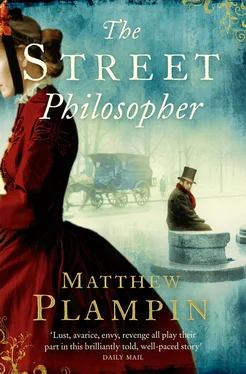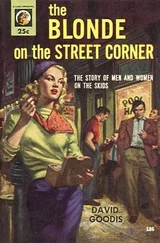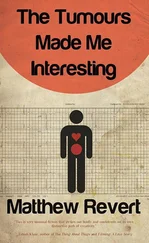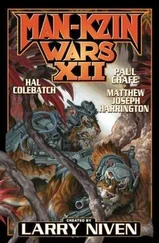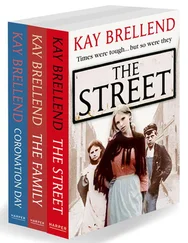‘Excuse me, doctor,’ she began, feeling a little awkward. ‘Permit me to introduce myself. I am Mrs Jemima James.’ She hesitated. ‘I am told that your intervention prevented this man’s death. A noble act indeed.’
He looked up sharply, his face hard and lean in the gaslight. ‘It was not noble , madam,’ he replied. ‘And I am no doctor.’
Immediately, Jemima’s interest was roused–this man had just saved a life, and yet seemed not only angry but strangely ashamed. She smiled disbelievingly. ‘Surely you have medical experience of some kind, though? How else could you have treated the major over there with such skill and success?’
‘He is a major? ’ The man’s tone was faintly hostile.
Jemima nodded, studying him. ‘So my brother tells me–from the 25th Manchesters. And he is in your debt.’
The man pulled himself upright. Jemima saw that his shirt and trousers were stiff with drying blood. ‘I did little enough, in truth. The major may die yet.’
He was silent for a moment, as if contemplating this bleak fact. Jemima noted that he had not denied her conjectures. She glanced at his boots, always the best indicator of wealth; they were inexpensive and a long way past their best. Perhaps he was once a medical student, she thought, obliged to abandon his studies due to lack of funds.
The man moved back from the edge of the pavement, smoothing his hair and straightening his ruined shirt. There was pleasing angularity to his features, interrupted only by deep crescents beneath the eyes, etched into the skin by want of rest. When he spoke again, his initial terseness was gone.
‘You must excuse my attire, Mrs James, and my manners. It has been a trying evening.’ He looked past her to the cart bearing the wounded officer, which was preparing to start up the street towards Piccadilly.
Jemima perceived that he was considering flight. ‘Tell me, sir,’ she said quickly, thinking to halt him, ‘if you are not a doctor, then what are you?’
‘I am a newspaperman.’ He made a shallow bow. ‘Thomas Kitson, madam. Of the Manchester Evening Star .’
Bill appeared breathlessly at Jemima’s side. He congratulated Mr Kitson for his efforts, shaking his damp hand before speculating briefly on the identity of the assailant. Then he informed Jemima that he was going up to his club to tell Freddie Keane and the rest of the chaps about the attack. Jemima tried to contain her irritation; this was typical of Bill. He would now stay out all night, roaming the very same streets he had been voicing such caution about ten minutes earlier–leaving her to endure their father alone. It had happened on countless previous occasions.
‘Mr Kitson,’ she said brightly, ‘would you do me the honour of taking some refreshment in my father’s office across the street? You must be in need of fortification after your labours, sir, noble or not. There is brandy, isn’t there, William?’
The deal had been proposed. Bill furrowed his brow, but he was not about to object. He nodded, mumbling an affirmative. Mr Kitson tried to protest, but was too tired and too courteous to disappoint her. After accepting Jemima’s invitation, he went to the cluster of working people close to the cart–not to check on the injured officer but to point out the location of the rusty lamp to a couple of workmen. It was most extraordinary. He seemed to be actively avoiding the man he had saved, as if he had some personal objection to him. Jemima could not account for it.
Bill walked Jemima and Mr Kitson back to the office, leaving them with the desk clerk. They sat before the window, Mr Kitson moving a chair next to the one Jemima had occupied earlier. The clerk, watching their bloodstained guest very closely, poured a tumbler of brandy and brought it over, setting it on the wide sill. Mr Kitson picked up the glass, hesitating when it was close to his lips. It was clear that he still found something about his hand profoundly distasteful. He had washed both quite thoroughly at the pump, but had evidently not managed to clean them to his satisfaction. Swallowing the liquor in one swift gulp, he put the glass back down and muttered an apology for his hastiness.
Jemima knew little of the Evening Star , but she felt that this man could not be a representative example of its staff. He had no real accent, for example–one would surely expect a correspondent from so modest a publication to be a Lancashire man from the lower middle classes, with the speech to match. I’d stake my library, she mused, on Mr Kitson being a recent arrival in our city. Adopting a cordial tone, she began to inquire politely about his situation.
He proved an agreeable if somewhat opaque conversationalist. He’d been in Manchester only since the end of the previous year, as she’d guessed. Other things about him, however, were more surprising.
‘I am the Star’ s society writer,’ he revealed. ‘A street philosopher, I believe it is called in these parts.’
‘ A street philosopher ?’ Jemima didn’t try to hide her amazement. ‘A professional gossip, you mean? The spy who lurks on the margins of our parks and theatres, labelling everyone who passes him with some acidic, facetious sobriquet? Surely not! I mean–you must excuse me, Mr Kitson, but you hardly seem the type.’ As a rule, Jemima tried to keep well clear of any publication that vaunted such writing as part of its appeal. It tended to be facile in the extreme, tawdry and vacuous, concerned only with fashion, scandal and money. And it was proving increasingly hard to avoid.
He appeared unperturbed by her reaction; there might even have been amusement in his eyes. ‘You flatter me with your doubt, Mrs James, but it takes more expertise than you might realise. There are important lessons to be learned, you know, from the living panorama of the modern city–lessons in the ever-shifting chances and changes of life.’ He turned his face away from the window as the major’s dray rolled past, a chattering crowd trailing behind it. ‘Besides, I was in urgent need of a position, and it was the only one available.’
Was this a mordant joke, or in earnest? Jemima found that she could not tell. ‘Are you working now, Mr Kitson? Can I expect to feature in the next edition of the Star ?’
The smile was a brief one, and obviously infrequent. ‘No, madam, I’m afraid that I have other responsibilities at present. My paper has no dedicated art correspondent, you see, so they have assigned me to cover the Exhibition.’
This disclosure made Jemima immediately impatient. The Art Treasures Exhibition was widely held to be the finest undertaking ever to be staged in Manchester, the city’s answer to the Great Exhibition of 1851. A vast display had been gathered from the private picture collections of the country, and then assembled in a modish iron-and-glass structure at Old Trafford, on the outskirts of town–well away from the grime of the factories. Charles Norton, Jemima’s father, was on the ninety-strong committee of local luminaries who had brought this thing into existence, and she had been made to listen to his boasting and self-aggrandising on the subject for the better part of a year. The building was to be opened in three days’ time, with all the pomp and splendour that the rich men of the city could procure. The trip to town for new clothes had been Jemima’s final trial before the occasion itself.
‘The Exhibition,’ she intoned heavily, dragging the word out to its constituent syllables. ‘Do you concur with the general chorus of opinion, then, Mr Kitson, and believe that it will be a magnificent triumph?’
‘I do, Mrs James, very much so.’ He paused. ‘But you, I think, do not.’
Jemima sat up in her chair. ‘I simply look around me, sir,’ she responded with some energy, ‘at the slums of Salford, and Ancoats, and elsewhere, and then at the glorious Art Treasures Exhibition, and the many thousands of guineas that have vanished into it, and I cannot help but think that if the masters of the Cottonopolis were really interested in the benefit of all, as they so frequently say, they would realise that an art exhibition is a long way down the list of things that our urban poor require.’
Читать дальше
